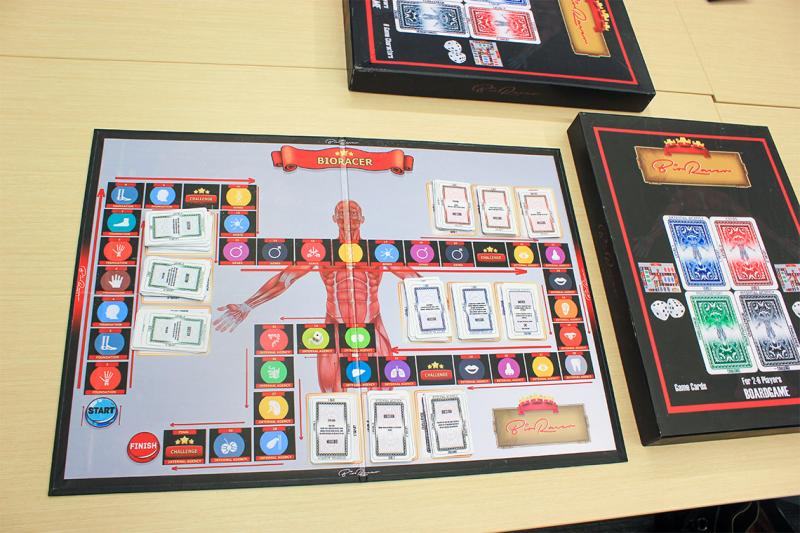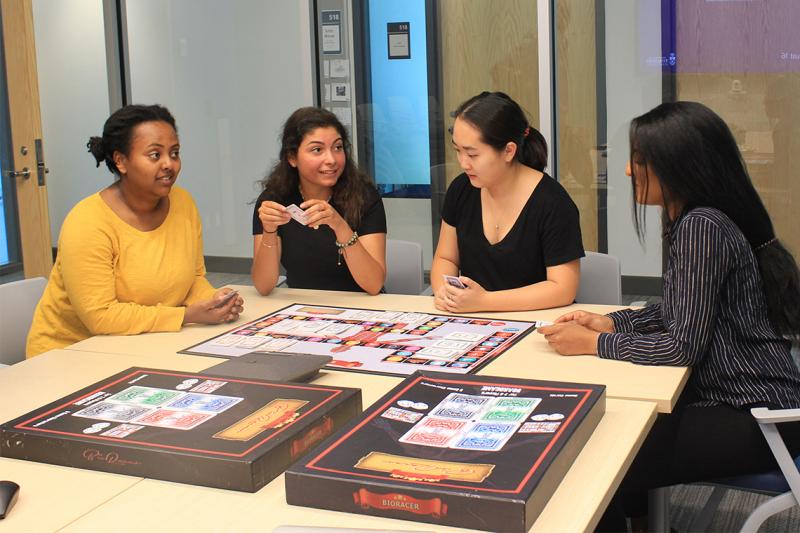June 7, 2021 | Volunteer & Awards
How a U of T class developed an award-winning board game for studying public health
By Tina Adamopoulos

The BioRacer board game developed by U of T Scarborough Assistant Professor Obidimma Ezezika and students including Maria Fusaro (BSc 2020 UTSC) and Mona Jarrah (BSc 2019 UTSC), aims to simplify complex course concepts and boost exam confidence through teamwork (photo by Mona Jarrah)
A professor at the University of Toronto and a small group of students have developed an award-winning board game that helps students study for exams.
“I teach this large public health biology course with about 170 students and was really looking for a way to make learning more enjoyable, fun and active,” says Obidimma Ezezika, assistant professor, teaching stream, in the department of health and society at U of T Scarborough.

Ezezika investigated using a board game to help his students study and found that they were being used as study tools in other branches of medical health studies – but none had been tailored for public health.
Enter the BioRacer board game, which Ezezika and his students developed in 2019 for his second-year course: Biological Determinants of Health. The goal of the Monopoly-style game is to simplify complex course concepts and boost exam confidence through teamwork.
As they navigate the board, students draw multiple choice cards that test their knowledge on four sections of the syllabus: genes; external agency; internal agency and foundational concepts in public health biology.
Ultimately, the student with the most correct answers wins. The collaborative aspect of the game comes into play if a student doesn’t understand a question. In that case, other players can jump in to help.
Ezezika recently received the D2L Innovation Award in Teaching and Learning for BioRacer and three other projects developed between 2018 and 2019. Awarded annually by the Society for Teaching and Learning in Higher Education and Desire2Learn, the international prize recognizes post-secondary educators who create student-centred opportunities in the classroom.
Students learn in different ways. Utilizing a variety of study tools provides an avenue for students who might gravitate to one or the other
“Students learn in different ways,” Ezezika says. “Utilizing a variety of study tools, from board games to lectures and tutorials, provides an avenue for students who might gravitate to one or the other.”
A two-year study involving 151 students tested BioRacer’s effectiveness. Members of the Global Health & Innovation Lab supported the testing and assessment, which was recently published in the Journal of Biological Education. The procurement of BioRacer was funded by U of T Scarborough’s Centre for Teaching and Learning.
Alumni remember how they helped develop BioRacer
Students who participated in the study reported that the collaborative nature of the game enhanced a sense of teamwork, eased the stress of studying and made it easier to review content that might otherwise be overlooked.
Recent graduate Maria Fusaro (BSc 2020 UTSC) was the student lead on the project and co-authored the article. She used her experience in the course to develop question cards.
“Being able to bounce ideas and simplify dense content to get an understanding helps students gain confidence in the information,” says Fusaro, who is now pursuing her master’s degree at the University of Guelph.
Multiple students reported they felt more comfortable and confident in responding to the questions on the midterm exam
The report highlights that the game’s relaxed environment helped students feel more comfortable sharing their understanding of the course. BioRacer also served as a taste of what to expect on the exam.
“Multiple students reported they felt more comfortable and confident in responding to the questions on the midterm exam because of that practice – in addition to traditional learning,” Fusaro says.

As an additional study tool, the board game helped students remember course material and apply it to real-life situations.
Mona Jarrah (BSc 2019 UTSC), who assisted in the project’s pilot test, explains that a student-lead approach to studying not only fosters a supportive environment, but also introduces a fundamental characteristic of the field.
“The public health program brings an interdisciplinary approach. You take different disciplines and integrate them collectively to solve a problem,” says Jarrah, now a master’s student in public health at Johns Hopkins University.
The public health program brings an interdisciplinary approach. The board game alluded to that because it allows people from different backgrounds and academic strong suits to come together
“The board game alluded to that because it allows people from different backgrounds and academic strong suits to come together.”
With the success of the analog version of BioRacer, Ezezika is currently seeking funding to develop a virtual version of the game.
“Any opportunity to provide additional resources for students’ learning helps break down barriers,” Ezezika says. “The board game was a way to acknowledge that and provide as many opportunities as possible.”

